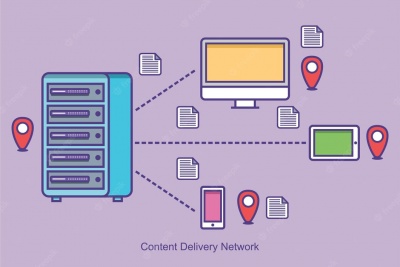AN INTRODUCTION TO CDNS AND SEO BENEFITS

Today, businesses are moving online to improve visibility and brand awareness, reach more customers and increase sales. To ensure all of these, your business has to be available as and when visitors need it. In the offline world, this availability is made possible by choosing the right location. In the online world, it is achieved by ensuring your website is reachable quickly and easily. Using CDN's will help achieve this and provide SEO benefits too.
Latency and Slow Speeds as Challenges
Business websites are hosted on servers that may be located centrally around the world. This means customers who are close to the data centre will see faster load speeds and experience low latency while those who are far will experience the opposite. The latency is the amount of time it takes for a request to be received by a server and for a response to be sent back. A long latency means slow loads and a bad user experience.
To solve this, businesses can employ CDNs. A CDN (Content Delivery Network) is a network of servers around the world that cache a copy of your website. As these servers are distributed around the world, each user is close to the “origin” of the content, and the result is lower latency and faster load times.
CDNs can also be configured to only cache larger files such as images and JavaScript files or to minify these files as they are requested. Minification ensures these files are of the smallest possible size so that they are delivered faster to end users.
The Relationship Between CDNs and SEO
The main aim of SEO is to make your website visible to as many people as possible by getting it to rank at the top of of the search engines for specific keywords, search phrases, or both. Businesses can thrive or struggle depending on their ranking. By improving SEO, businesses can ensure they remain high on the search engine results pages (SERPS), which increases visibility, attracts more customers, and leads to a positive impact on bottom lines.
To rank high in the SERPS, search engines look at several criteria called ranking factors. A major change to how businesses view these ranking factors came about when Google announced in 2018 that it would focus on websites that offer a greater experience to mobile users. One part of that experience is load times.
CDNs are linked to SEO at the point that the former helps make websites faster, thereby helping them rank higher.
But how do CDNs do this and what other ways do they benefit SEO?
Faster Load Times
As we have seen above, content that is located closer to a visitor will be served faster due to the lower latency. If web pages are loading quickly, users have an incentive to stay on a website longer. The result is lower bounce rates, increased pages visited per visit, and increased time spent on the website. All of these are important metrics for showcasing your website is useful to visitors. This prompts Google and other search engines to send more people to this helpful website by ranking it higher.
Another way fast load times help SEO is by Improving Tie To First Byte (TTFB). The TTFB is an important ranking factor and is the amount of time between a page requesting data and receiving the first byte of data. A lower TTFB means that users see a response quicker if they click, scroll, submit a form, or visit a second page on your website.
Lastly, faster load times improve the First Input Delay. This is the amount of time between a user making a request and the website completing the request. It is an important ranking factor too as it affects user experience, and this is why it is part of Google's Core Web Vitals.
Better Reliability Leading to Improved Content Availability
Users expect that your website is always available when they visit, and Google expects this too when it crawls your website. It would be unfortunate for some of your pages to go offline as their ranking can plummet.
By distributing traffic between different nodes (servers) around the world, a CDN can help your website handle large waves of traffic thus stopping it from going down. This is the fundamental way a CDN helps prevent DDoS (Dedicated Denial of Service) attacks, which is another benefit of using a CDN.
Although technology has come a very long way, there is always the chance of failure in one of your website's many moving parts. Hardware and software failure can lead to website unavailability, which could be catastrophic for your rankings.
A CDN routes traffic to servers that already have a cache of your website if a CDN provider notes that your website is unavailable. This failover function means that users get an uninterrupted experience as you work on whatever has made your website unavailable on your end.
Better Image Optimisation
Images are typically the largest files on a website. They can cause numerous optimisation issues, especially if you are loading many of them on a single page. The caching and compression you get with a CDN also apply to images helping you see some SEO benefits here too.
Most CDNs will give you control over compression and image quality so you can have a balance between having images that look great but that also load quickly. The main ranking factor that is affected here is the Largest Contentful Paint. This is a measure of how much time it takes for the page to be fully downloaded and ready for a user to interact with.
A substantial Largest Contentful Paint will hurt the user experience, and this is why this metric is part of the Core Web Vitals.
Use of New HTTP Protocols
HTTP/1.1 has been used as the main HTTP protocol for decades, but we now have HTTP/2. The main benefit of this newer protocol is multiplexing, where files are loaded simultaneously instead of consecutively. Some websites have reported cutting download times by up to 40% and because it is so easy to implement there is no reason why you should not be using this newer protocol.
While there are many ranking factors that search engines consider, load speeds and Core Web Vitals are the most important. CDNs help improve both by making optimisations, faster load times, lower latency and caching available to all websites that use them.

